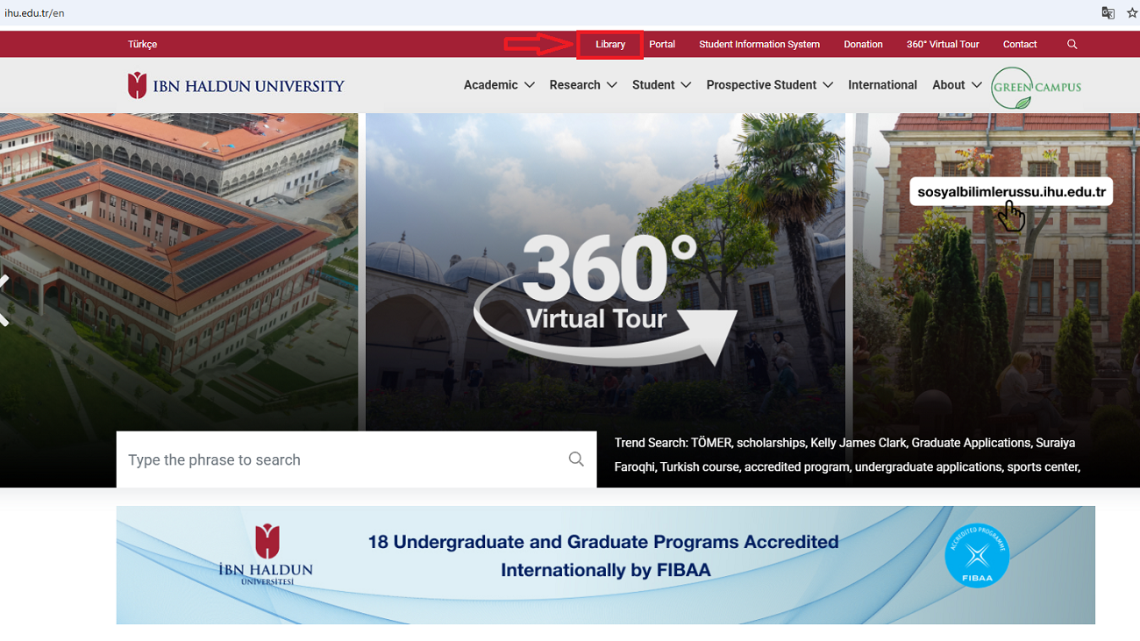

This page features infographics explaining topics related to academic incentives, document provision, research in e-resources, user operations, off-campus access, publication processes, and library services.
IHU Library: Getting Started Guide
This guide provides basic information for first-time users of the İHÜ Library, covering how to familiarize yourself with the library, discover its services, and utilize its resources.
İHÜ Library: General Information
This section provides general information about the vision and mission of the İbn Haldun University Library, its collections, the services it offers, its work areas, and the borrowing process.
Contains information on 24/7 access to various information resources such as printed and electronic books, e-books, journals, e-journals, theses, and artificial intelligence tools.
Contains information about catalog searching, borrowing and returning items, reservations, publication requests, creating reading lists, and managing user-specific settings with your library account.
Processes for Accessing Resources
Includes borrowing, reserving, publication ordering, and document delivery processes for accessing resources at the IHU Library.
Includes the process of borrowing books from the library, which involves catalog search, locating books on the shelf, borrowing, extending the loan period, and returning the books.
Research Process in e-Resources
This includes how to select the right journal and database for research, its importance, application steps, control criteria, and consultation services.
Journal Selection for Publication
This includes the importance of selecting the right journal for research, the criteria to consider, the application steps, and the support services offered by the library.
The academic incentive program involves rewarding IHÜ members (academics, visiting academics, students, and administrative staff) for their academic work published in national and international peer-reviewed journals and books.
IHU LibAI Hub Artificial Intelligence Center
The purpose of the İHÜ LibAI Hub Artificial Intelligence Center is to provide information about the artificial intelligence tools and platforms it offers, its training and workshop activities, and the reservation and usage processes.
1) You can access the Ibn Haldun University Library website at https://library.ihu.edu.tr/en or by first going to the Ibn Haldun University homepage at https://www.ihu.edu.tr/en and clicking on the Library tab.

2) To access your library account, you must first register with the library. All our students, faculty members, and administrative staff are natural members of the library. Membership procedures are handled by library staff.

3) To access your library account, click on the “Log in” tab located in the upper right corner of the https://catalog.ihu.edu.tr/yordam address.

4) Your username and password are the same as your İHÜ email username and password.

5) You can then access your library account.

6) You can submit your request by going to the “Publication Order” link on our library website or by filling out the “Publication Request Form” in your library account.

7) You can view the materials you have borrowed through your library account and track their due dates. Additionally, you can request an extension of your loan period within the last three days of the due date.

Ibn Haldun University Library provides our students, academic and administrative staff with access to library resources from outside the campus. This access is provided via LDAP (Lightweight Directory Access Protocol). Below, you can find detailed information on how to use LDAP for off-campus access.
1) To access e-resources subscribed to by the Library outside the campus, first go to the subscriber databases page.

2) Enter your İHÜ e-mail “username” (e.g., sonmez.celik) and “password” in the relevant fields.

3) You can then access electronic resources (databases, e-journals, e-books, etc.) from outside the campus.

This guide explains how artificial intelligence technologies can be used in academic work. It provides information on generative AI tools and principles for ethical usage.

What is Artificial Intelligence?

Productive Artificial Intelligence

Literature Review and Writing Processes
Image Rendering Tools
Video Creation Technologies

Tips for Effective Use
Ethics and Artificial Intelligence
